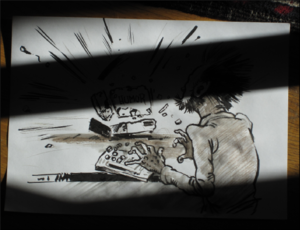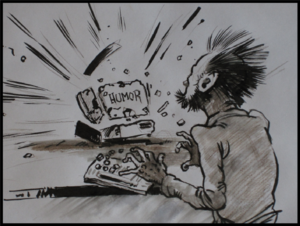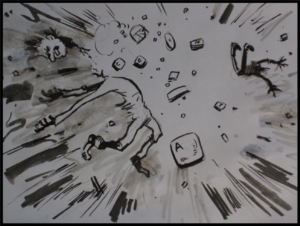The best comedic methods; analysis
Comedic writing is, without a shade of doubt, the easiest form of literature. You may think this is not so. You may think writing comedy is the very hardest thing on earth. You may think coming up even with one (1) good joke is such a gargantuan task that the attempt must certainly be doomed. I will, however – and I use the word carefully – give an in-depth analysis of the amazing!! methods that have forced me to arrive at my own conclusions. I do this solely for the benefit of my peers, who doubtlessly will be able to glean innumerable gems of sparkling wisdom and decidedly unbeatable insights from this article.
It bears to be noted that even if you are an accomplished writer with impeccable style and sure-fire comedic methods, you will still benefit from this article. Reading it will just boost your abilities beyond belief. You will be able to come up with brilliant one-liners at the rate of six per minute. Reading the article aloud to your semi-deaf grandmother will serve as a wonderful new way of testing her hearing aid. Memorising every word to be repeated as mantras during times of hellish distress will do wonders for your suffering soul – and you will also gain street credibility as you mumble away.
I see before me a side-splitting article. I have not written it yet, but I'm so full of confidence that I cannot imagine any possible failure at the task ahead. You can feel the power too, can't you? You're itching to finally get to the actual business at hand – the literary methods that will make you a golden comedic writer, who will earn millions of Zlotys by merely farting into the computer. This is a promise: I will not disappoint you! After reading this article you will be at least 1500% better at writing comedy than you used to be – if I have understood this percentage thing correctly.
Method 1: Underestimating the reader
At the risk of repeating what the header already states, you can underestimate the reader in a number of ways.
- You can pile pointless repetition upon pointless repetition upon pointless repetition upon him – or her – hoping that this will somehow turn out to be funny. Turn out to be funny! This always leaves a back door open: you can grow incoherent at any point and just say that your computer exploded when you farted into it and you couldn't come up with anything better.
- You can underestimate your reader in a more subtle way – for instance, raising yourself so high onto a pedestal that you become unassailable in your own view. If you cannot do this comparably well, i.e. in such a way that you actually believe your own words, you can always use the trick of the fart-and-exploding-computer. Then it won't matter what anyone believes, because my computer just exploded.
- You may force yourself to believe the reader has no way of discerning good text from bad text – which he won't if his computer explodes.
Method 2: Overestimating the reader
This method is far less tricky than the previous one.
- Write any old thing that crapcakes its way into your consciousness or just the type whatever it is. There is a good chance that your reader will think this is very profound – or alternately cocks so low-brow that he will think it is somehow funny, and there's a fart and the computer then explodes and he laughs in a low-brow way. Isn't this another way of underestomatoes the reader? Oh I don't think so. If you're capable of overestimating yourself, you're just as capable of overestimating others. In that way, this method is really easy. It is a quality method if any go with it now.
- Imagine that the reader will come up with jokes himself (or her) when they (this is a compromise) are reading (luckily verbs don't need to be transformed along with the pronouns) your terribly boring article about exploding computers. This might, again, look like another way of underestimating – but it is a question of your point of view, really. Under, over, schmunder, schmover. I think my computer is just about to explode, even though I'm too bored to even fart.
Method 3: Estimating the reader spot on
This method runs into one fundamental problem: which reader are you going to estimate? Alternatively, can you find the smallest common denominator, the one line of writing that wins the day every time? Is that even possible with cases of Asperger's Syndrome and Dramatic Exploration Incoherence Witlessness running riot among your potential audience? Rest assured: after reading the next two or three bulletin points, you will always be able to write for the widest possible audience.
- Go for it. I mean, really go for it! Write the best stuff you can! You can do it!
- Do it now! Find that smallest common denominator! Find it and use it! You can do it! It will always work!
- Do it do it do it! Make that computer explode! You can do it! Explode it good! Go for it! EXPLODE THAT SUCKER NOW!
Conclusion
This article, while it may seem a total success to the unaided eye, obviously fails to address the most difficult problem of comedic writing properly. We are not even certain what the problem is, ourselves, because we are so immersed in the magnificence of our own writing. Somehow, though, there is a sneaking suspicion about the foundations of our own thought processes. We might be skirting the problem even very closely, yet we might not be able to quite put our finger on it. And just as we are about to hit upon the problem – and thereby ways of solving it – our computer explodes, because we couldn't help farting into it and the dog also farted into it.



